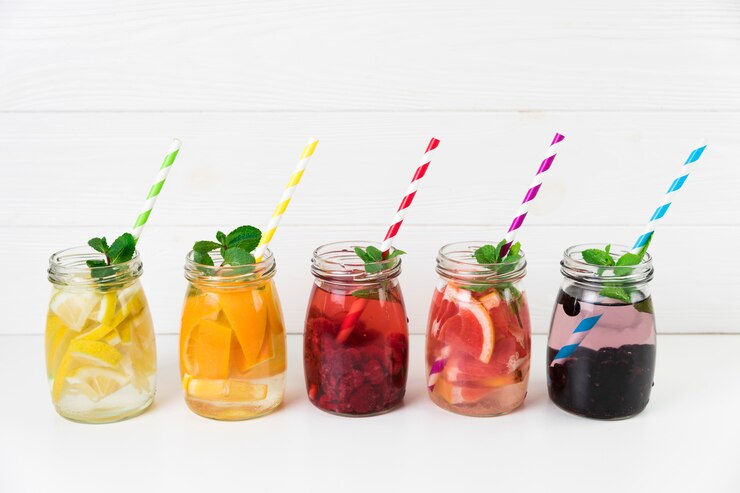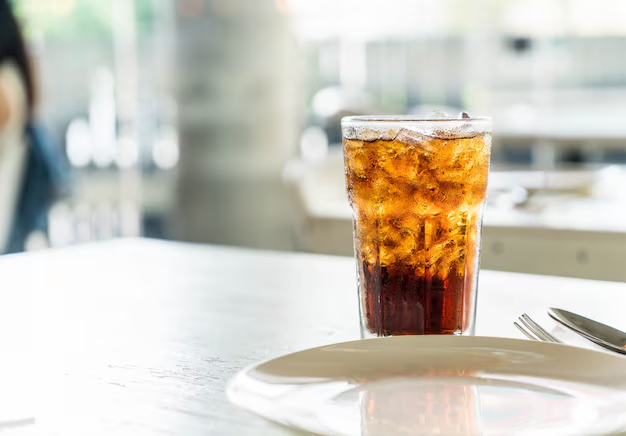Iced tea is a refreshing drink enjoyed by millions in the U.S. Known for its versatility, it’s available in various forms like sweetened, unsweetened, bottled, or freshly brewed. But a common question health-conscious individuals ask is, “Does iced tea have caffeine?”
The short answer is yes. Most iced teas contain caffeine, but the amount depends on several factors. Understanding caffeine levels in iced tea is crucial for those looking to monitor their intake, especially if they are sensitive to caffeine or trying to make healthier choices. Let’s dive deeper into what iced tea is and how its caffeine content varies.
What is Iced Tea?
Iced tea is a chilled version of brewed tea, typically served over ice. It can be made from a variety of tea types, including black, green, white, and herbal teas. There are two main categories of iced tea: homemade and commercially bottled.
Homemade iced tea allows more control over ingredients and brewing time. Bottled iced teas, however, often contain added sugars, flavors, and preservatives. They may also have varying caffeine levels based on the brand and type of tea used.
This caffeine content can vary widely. Why? It depends on the type of tea leaves, brewing method, and additional ingredients used. For example, black tea-based iced tea usually contains more caffeine than green or herbal varieties.
Does Iced Tea Contain Caffeine?
Yes, most iced teas contain caffeine. The amount, however, depends on the tea used as the base and how it is prepared. Tea naturally contains caffeine because it is derived from the leaves of the Camellia sinensis plant.
Here’s a breakdown by tea type:
- Black Tea Iced Tea – Black tea contains the highest amount of caffeine among all tea types.
- Green Tea Iced Tea – Contains moderate caffeine levels, lower than black tea but higher than white tea.
- White Tea Iced Tea – Generally has the lowest caffeine among traditional tea types.
- Herbal Iced Tea – Naturally caffeine-free because it doesn’t come from tea leaves.
- Matcha Iced Tea – Matcha, made from powdered green tea, has significantly higher caffeine due to its concentrated form.
Caffeine Content in Different Types of Iced Tea

The exact caffeine content can vary based on preparation methods, serving size, and the tea type. Here’s a quick comparison:
| Type of Iced Tea | Caffeine Content (Per 8 oz) |
| Black Iced Tea | 20-70 mg |
| Green Iced Tea | 15-40 mg |
| White Iced Tea | 10-30 mg |
| Herbal Iced Tea | 0 mg (naturally caffeine-free) |
| Matcha Iced Tea | 60-80 mg |
Comparison with Coffee and Energy Drinks:
- A standard cup of coffee contains about 95 mg of caffeine per 8 oz.
- Energy drinks often range from 70-150 mg per 8 oz.
This means most iced teas, except for matcha, have significantly less caffeine than coffee or energy drinks. Herbal option is an excellent option for those who want a completely caffeine-free alternative.
Factors Influencing Caffeine Levels
Several factors determine how much caffeine your iced tea contains. Let’s explore these:
1. Type of Tea Leaves
The type of tea used significantly impacts caffeine levels.
- Black tea leaves are fully oxidized, which results in higher caffeine.
- Green and white tea leaves are less processed, meaning lower caffeine.
- Herbal teas are made from herbs, flowers, or fruits, which naturally lack caffeine.
2. Brewing Time and Temperature
Longer brewing times extract more caffeine from tea leaves. Similarly, brewing at higher temperatures also releases more caffeine. For example, steeping black tea for 5 minutes at 200°F will yield more caffeine than steeping for 2 minutes at a lower temperature.
3. Serving Size
Larger servings naturally contain more caffeine. For example, a 16 oz iced tea will have double the caffeine of an 8 oz serving.
4. Brand Differences
Commercially bottled iced teas can vary significantly in caffeine content. Some brands label their caffeine levels, while others don’t. Homemade options allows better control, enabling you to adjust caffeine by choosing specific teas or brewing methods.
How Iced Tea Compares to Other Caffeinated Drinks
When it comes to caffeine, iced tea falls somewhere between soda and coffee. Let’s compare these popular beverages to give you a clear picture:
1. Coffee
Coffee is a powerhouse of caffeine. An 8 oz cup of brewed coffee contains about 95 mg of caffeine, much higher than most iced teas. Specialty coffee drinks like lattes and espressos can contain even more. If you’re looking to reduce your caffeine intake, swapping coffee for iced tea (except matcha) is a good idea.
2. Soda
Sodas, especially colas, typically have lower caffeine than iced tea. A standard 12 oz cola contains about 30-40 mg of caffeine. However, soda is often loaded with sugar and artificial additives, making iced tea the healthier choice, especially when unsweetened.
3. Herbal Teas
Herbal teas are naturally caffeine-free. Popular herbal iced tea blends include chamomile, peppermint, and hibiscus. These teas offer a flavorful alternative for those looking to avoid caffeine altogether.
Caffeine-Free Iced Tea Options

Not all iced teas contain caffeine. For caffeine-sensitive individuals, there are excellent alternatives:
1. Decaffeinated Iced Tea
Decaffeinated versions of black and green teas are widely available. These teas undergo a process to remove most of their caffeine content while preserving their flavor and antioxidants. They’re perfect for those who enjoy the classic taste of iced tea without the stimulating effects of caffeine.
2. Herbal Iced Teas
Herbal iced teas are made from plants, flowers, and fruits rather than tea leaves. Popular caffeine-free herbal options include:
- Hibiscus tea: Tart and tangy, with a vibrant red color.
- Rooibos tea: A sweet, earthy option from South Africa.
- Chamomile tea: Mild and soothing, often used to promote relaxation.
Recommendations for Caffeine-Sensitive Individuals
- Look for labels that say “decaffeinated” or “caffeine-free.”
- Brew herbal teas at home to ensure no caffeine content.
- Avoid blends that include black, green, or white teas unless specifically decaffeinated.
Effects of Caffeine on the Body
Caffeine has a range of effects on the body, both positive and negative. Understanding these can help you make informed choices about how much to consume.
Positive Effects
- Boosts Energy: Caffeine acts as a stimulant, helping you feel more alert and energized.
- Improves Focus: It can enhance concentration and cognitive performance.
- Elevates Mood: Moderate caffeine consumption is linked to improved mood and reduced risk of depression.
Potential Side Effects
- Jitters: Too much caffeine can cause restlessness or anxiety.
- Insomnia: Consuming caffeine late in the day may interfere with sleep.
- Dehydration: Caffeine is a diuretic, which can lead to fluid loss if not balanced with water intake.
- Digestive Issues: Some individuals may experience upset stomachs or acid reflux from caffeine.
FDA Recommendation
The U.S. Food and Drug Administration recommends limiting caffeine intake to 400 mg per day for most adults. This is roughly equivalent to:
- 4 cups of coffee.
- 8-10 cups of black iced tea.
For those who are pregnant or sensitive to caffeine, the recommended limit is lower.
Tips for Managing Caffeine Intake
Managing your caffeine intake doesn’t mean you have to give up iced tea altogether. Here are some tips to enjoy it responsibly:
1. Choose Decaf or Herbal Options
Opt for decaffeinated black or green iced tea if you love traditional flavors. If you prefer something entirely caffeine-free, go for herbal teas like hibiscus or rooibos.
2. Limit Portions
Stick to a single serving of iced tea rather than supersized options. Smaller portions naturally contain less caffeine.
3. Avoid Caffeine Late in the Day
To prevent sleep disturbances, avoid consuming caffeinated iced tea in the evening. Herbal teas are a better choice for nighttime refreshment.
4. Check Labels on Bottled Teas
Bottled iced teas vary widely in caffeine content. Brands often include this information on the packaging. If it’s unclear, you can look up the brand online to find details.
By keeping these tips in mind, you can enjoy iced tea without any side effects.
FAQs
1. Does bottled iced tea contain more caffeine than homemade?
It depends on the brand. Some bottled iced teas are made with concentrated tea extracts, which can have higher caffeine levels. Homemade iced tea, on the other hand, gives you full control over the brewing process and caffeine content.
2. Is iced tea healthier than soda?
Yes, especially unsweetened iced tea. Soda is typically high in sugar and artificial additives, which can contribute to weight gain and other health issues. Unsweetened iced tea offers antioxidants without added sugars, making it a healthier alternative.
3. Can I reduce the caffeine content in homemade iced tea?
Absolutely. To reduce caffeine, steep the tea for a shorter time or use fewer tea leaves. You can also opt for decaffeinated teas to make your iced tea.
4. Does green iced tea have less caffeine than black iced tea?
Yes, green iced tea usually has less caffeine than black iced tea. An 8 oz serving of green iced tea contains around 15-40 mg of caffeine, while black iced tea can have 20-70 mg per serving.
5. Are herbal teas safe for children?
Most herbal teas are safe for children since they are naturally caffeine-free. However, it’s best to consult a healthcare provider if you’re introducing a new type of herbal tea to your child’s diet.
Conclusion
Iced tea is a refreshing and versatile beverage with caffeine levels that vary based on type, preparation, and serving size. Whether you prefer black, green, or herbal iced tea, understanding its caffeine content can help you make healthier choices.
For those sensitive to caffeine, decaffeinated and herbal options provide flavorful alternatives. With moderation and mindful habits, iced tea can be an enjoyable part of a balanced diet.

